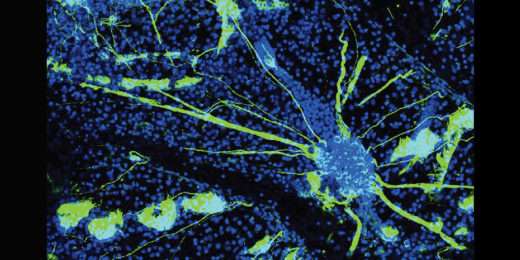When it comes to love, do opposites attract or do birds of a feather flock together? Surprisingly, the scientific research on romantic compatibility has produced conflicting results, with some studies suggesting that similarities in personality, demographics and attractiveness predict happily ever after, and others suggesting it's the differences that sustain a relationship.
It's enough to make TV's "Sex and the City" character Carrie Bradshaw wonder: Is there a better way to predict marital happiness?
A new study authored by Vinod Menon, PhD, the Rachael L. and Walter F. Nichols, MD, Professor, and collaborators in China took a look at whether marital success could lie in the synchronization of a couple's brain waves. The study was published in the Proceedings of the National Academy of Science.
The researchers recruited 35 heterosexual couples living in China who had been married for at least a year. They were given a battery of personality tests and demographic surveys and were asked to rate their marital satisfaction.
"The literature has been actually quite mixed about how personality affects compatibility, and that turned out to be the case in our study," said Menon, a professor of psychiatry and behavioral sciences. "We found that the links between marital happiness and behavioral measures, like personality tests, were quite weak."
The researchers found no significant association between relationship satisfaction and age, sex, length of marriage or personality traits.
Seeking a more accurate way to predict marital happiness, the researchers scanned the brains of participants using functional MRI and measured brain activity as the participants watched a variety of movie clips. Some depicted scenes related to marriage, such as couples talking about their relationship, sex or children, while others depicted non-marital subjects, such as documentaries about flowers, architecture or food.
Brains in sync
When researchers analyzed the brain activity, they found that couples who reported higher satisfaction in their relationship had greater neural synchronization while watching the marriage-related clips -- that is, they were more likely to have the same parts of their brain active at the same points during the videos. The non-marital clips did not trigger more synchronization in married couples, happy or not.
"The effects are really specific to the context," Menon said. "It's not generic synchronization to every stimulus."
On average, married couples showed significantly more synchronization than random pairs of male and female participants while watching the marital videos.
"Married couples overall, compared with random couples, had more similar brain activity independent of levels of satisfaction. On top of that, you get additional synchronization in those who self-report to be more satisfied in their marriage," Menon said.
The synchronization was particularly pronounced in areas of the brain known collectively as the default mode network, which is involved in self-referential mental activity, such as thinking about oneself or oneself in the context of others.
"This is the system that your brain defaults to when you're at rest, and is suppressed when you're engaged in a challenging cognitive task like remembering a long string of numbers or solving a math problem," said Menon, who led the Stanford Medicine team that discovered the default mode network 20 years ago. It's also the part of the brain that is activated during social communication, such as anticipating what comes next in a conversation, which is no doubt important in relationships.
Neural synchronization suggests that two people are processing information similarly, Menon said, though it's impossible to know from the current study whether that reflects similar conscious thoughts, subconscious processes, or both.
Destiny or familiarity?
The study also raises the intriguing question of whether similar brain activity brought some couples together and destined them to happy marriages, or whether being in a happy marriage caused brain activity to converge.
"We don't know whether there is selection based behaviors arising from similar brain activity in a relationship, or whether couples evolve over time to develop similar anticipatory and predictive brain representations," Menon said. The activity of the default mode network is altered in neurodevelopmental disorders and dementia, which are the main focus of Menon's research.
The current study was designed with Menon's former student, Xujun Duan, who is now at the University of Electronic Science and Technology of China.
Could measuring neural synchronization be the next frontier in the dating industry?
"Perhaps if I were more entrepreneurial ...," Menon said. "But that's very far removed from what I do."
Photo by Kateryna Kovarzh






